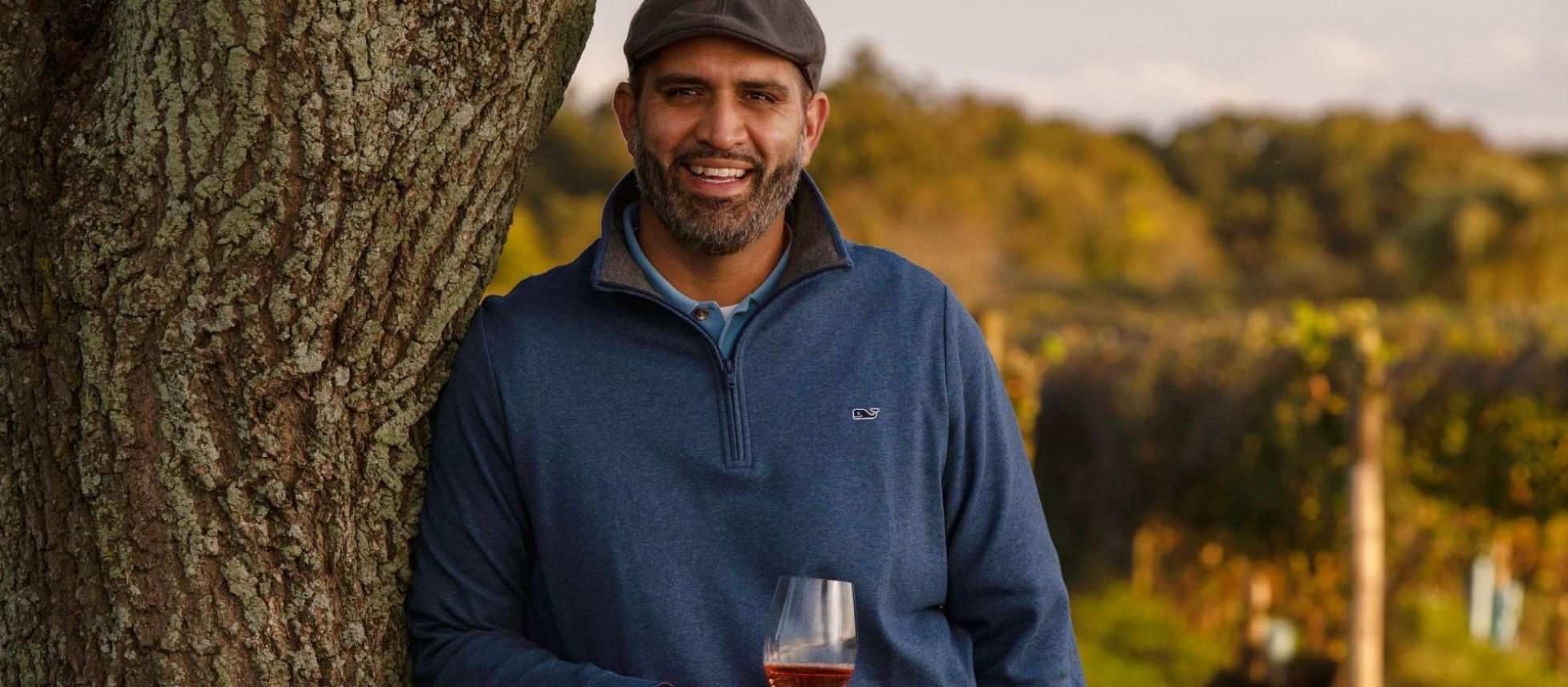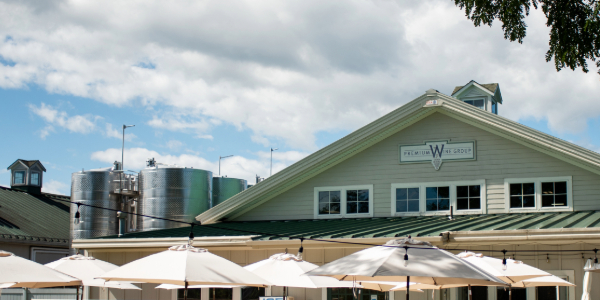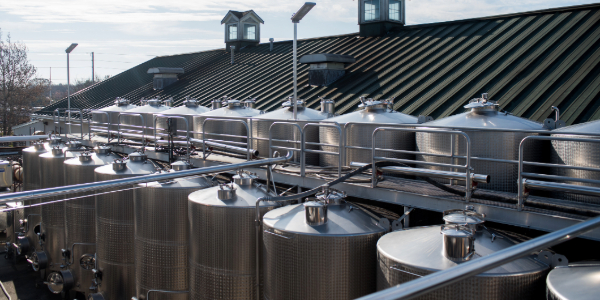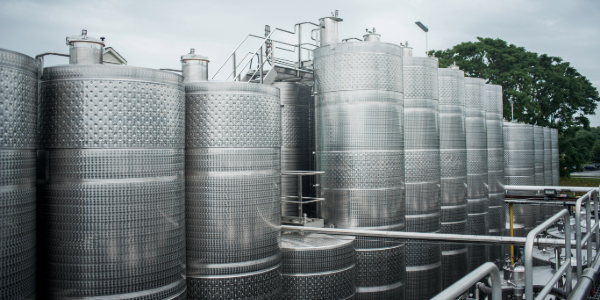Blog
Innovators Profile
Winemaking Within Reach: How Premium Wine Group Supports Wine Producers

As the cost of production soars and demands shift, Premium Wine Group (PWG) provides contract services allowing producers to focus on quality while PWG handles the heavy lifting
Winemaking is often celebrated as an art, with the winemaker at its helm, guiding the process from harvest to bottling. However, behind this craft lies a highly technical and capital-intensive operation, requiring significant investments in equipment, labor and time. As production costs rise and market demand fluctuates, the financial burden of maintaining a full-scale winery has become increasingly complicated and financially cumbersome. This is where contract winemakers like Premium Wine Group (PWG) play a crucial role. Based in Long Island, PWG began as a bin-to-bottle operation, providing winemaking solutions to producers who lacked the infrastructure to do it themselves. Over time, the company has expanded its expertise beyond wine, now offering production services for beer, cider, spirits, and RTDs (ready-to-drink beverages).
In conversation with Juan Micieli-Martinez, Executive Winemaker and General Manager at Premium Wine Group, we explore how PWG supports its clients, the innovations shaping the market, and how the company continues to evolve to meet industry demands.
Edited excerpts from the interview.
Can you provide an overview of Premium Wine Group, its services, and how the company has evolved over the years?
Premium Wine Group was founded in 2000 as a custom crush production facility, serving local vineyards. Our core service, which we describe as "bin to bottle," allowed winemakers to bring in their grapes and leave with a finished bottled product. In the early 2000s, we saw increasing demand for co-packing services, leading us to expand into that space in 2004. But for nearly two decades, custom crush remained the primary focus of our business. Currently, we operate a state-of-the-art, high-speed bottling line and hold a Basic Permit (BSP) license, enabling us to work across both the wine and spirits sectors.
Today, Premium Wine Group has expanded its capabilities to include inline carbonation, pasteurization, and a variety of packaging and closure options. We also formulate and produce ready-to-drink (RTD) beverages, making us a truly multifaceted player in the craft beverage industry. While our name remains Premium Wine Group, our expertise now spans the broader craft beverage landscape, serving both traditional and emerging categories.

Premium Wine Group
Premium Wine Group initially focused on winemaking but has since expanded into multiple beverage sectors. How has the company evolved in terms of technology and innovation to meet the demands of a changing industry?
When I describe Premium Wine Group, I often compare it to Grand Central Station—there’s a constant flow of people from different corners of the beverage industry, whether it’s wine, spirits, or beyond. Because we operate as a fully bespoke facility, adapting to our clients’ needs has been at the core of our evolution. Over the years, we’ve integrated a wide range of advanced technologies like micro-oxygenation, cross-flow filtration, and dissolved oxygen removal techniques. One significant development has been Total Package Oxygen (TPO) management, which involves adding nitrogen tabs after bottling to control oxygen levels and ensure product stability. Beyond that, we’ve worked with reverse osmosis and are now exploring de-alcoholisation equipment to meet the growing demand for no- and low-alcohol beverages. The industry is continuously evolving, and we’ve had to evolve with it. When I first stepped in this business, I wanted to be a winemaker. Now, I’ve worked with beer, cider, and spirits—each requiring its own specialized approach. The key to longevity in this business is adaptability, and that’s something Premium Wine Group has prioritized from the beginning. If you don’t evolve, you get left behind.
The no- and low-alcohol category has been gaining significant traction in the market. Given that Premium Wine Group is investing in dealcoholization processes, can you share more about this initiative?
We are currently partnering with Omnia and the Delatafla Group to introduce their first entry into the dealcoholization market. As part of this collaboration, they will be positioning one of their new pieces of equipment at our facility for trial and demonstration. This marks a new venture for us, as we have not previously engaged in de-alcoholization on our own.
However, our goal is to assess the demand and understand how this segment performs regionally. While it’s clear that many brands are actively exploring the no- and low-alcohol space, we want to gauge how this innovation aligns with our market and client needs before fully integrating it into our services. It’s an exciting step, and we’re eager to see how it unfolds!
[[relatedPurchasesItems-62]]
In today’s industry, digital tools and data analytics play a critical role in optimizing production, packaging, and supply chain management. How is Premium Wine Group incorporating these technologies to enhance efficiency for its clients?
One area we’ve been actively improving is the management of dry goods. Historically, this has been a challenge, but we are now restructuring our operations to provide better support in tracking and managing packaging materials. By implementing detailed spreadsheets and depletion tracking during bottling, we can offer clients real-time insights into material usage and efficiency metrics. Additionally, every aspect of our production is recorded in our database, allowing us to analyze key data points—from the volume of wine received to the final packaged output. This helps us identify inefficiencies, minimize losses, and ensure a more streamlined process.
On the technology front, we’ve also evolved significantly. When we first started, we relied on traditional pad filtration, which required multiple passes and resulted in increased product loss and oxygen exposure. Now, we utilize cross-flow filtration, which achieves the same level of filtration in a single pass, reducing both losses and oxygen pickup. Between advancements in filtration technology and our new focus on inventory management, we’re helping clients gain better visibility into their production processes, reduce waste, and improve cost efficiency.

Sustainability has become a key focus in the beverage industry, with both consumers and producers prioritizing environmentally responsible practices. How is Premium Wine Group addressing sustainability, and what specific demands from clients have shaped your approach?
Sustainability is a priority for us, and we actively encourage our producers to adopt more eco-friendly practices. One of the simplest yet most effective changes we advocate for is the use of lightweight glass bottles. The industry now offers a range of options that reduce environmental impact without compromising quality, and we urge our clients to explore these alternatives. However, one of the most significant sustainability initiatives we’ve implemented is the installation of a wastewater management system known as BioGill. While winemaking is often associated with the romantic aspects of vineyards and barrel aging, the reality is that it also generates a substantial amount of wastewater. This wastewater contains nutrients that simply cannot be released untreated. To address this, we installed the BioGill system, which utilizes naturally occurring bacteria to break down biochemical oxygen demand (BOD) in wastewater before it is released into the environment as untreated wastewater with high BOD can disrupt ecosystems. What makes this initiative even more meaningful is that it wasn’t a regulatory requirement—we took the initiative to implement it because we recognized its importance.
Are there any notable trends in winemaking processes or production techniques that you're seeing among your clients?
We work closely with our clients to produce exactly what they envision. However, from an industry-wide perspective, I believe there’s a real need for more innovation, especially in the wine sector. One of the key shifts we’re seeing is that younger consumers don’t necessarily want to drink what their parents or grandparents drank. They’re gravitating toward new styles, unique blends, and flavor-driven options rather than traditional varietal distinctions. While they may develop a deeper appreciation for those classic categories over time, the current demand is leaning toward more creative, hybrid products.
For instance, we’re currently in discussions with a client about producing a spirit and rosé blend—something that likely wouldn’t have been considered years ago. There’s growing interest in wine-based RTDs and other innovative beverage concepts that merge different categories. This trend aligns with the broader shift toward low- and no-alcohol beverages, as well as mixed-format drinks.
[[relatedPurchasesItems-62]]
What advantages does a producer gain by partnering with Premium Wine Group instead of managing production in their own facility?
Entering the wine industry is a significant financial commitment. Establishing a vineyard requires years of investment before the first viable harvest, followed by the unpredictable challenges of nature. On top of that, setting up a fully equipped winery with modern production capabilities involves substantial capital expenditures. The purpose of Premium Wine Group was to remove these barriers by offering a state-of-the-art production facility that allows producers to focus on crafting high-quality wine without the burden of infrastructure costs. Our investments are entirely focused on production, giving clients access to advanced technologies all without requiring them to purchase or maintain this equipment themselves.
For example, our macro labeler, a half-million-dollar machine, uses a sophisticated camera system to ensure perfect label placement, even on bottles with unique notches or design elements. Across our entire bottling line, we have invested $3 million in equipment, all of which is available to our clients. This partnership allows producers to dedicate their resources to sourcing the best ingredients and refining their formulations while we handle the complexities of production and packaging. Whether a client wants to create a sparkling wine with a cork and cage or a spirit in a custom bottle with a bar top, we provide the expertise and technology to bring their vision to life. While we don’t offer distillation services, we can proof and work with spirits, ensuring the final product meets the highest standards.

Looking ahead, what technological advancements or industry shifts do you believe will shape the future of contract winemaking and co-packing?
One of the biggest opportunities right now lies in the availability of affordable bulk wine. This opens the door for innovation—experimenting with new formulations, blending styles, and branding strategies that capture consumer interest. The current bulk market presents a chance to source quality wines at competitive prices, which can be leveraged to create compelling, accessible products.
Branding also plays a critical role. While the low- and no-alcohol trend continues to grow, encouraging responsible consumption, there is still a need to engage consumers with traditional wine. Wine is more than just a beverage—it carries a sense of place, history, and culture. It’s an experience tied to terroir and travel, and I believe younger consumers will eventually gravitate toward it as they develop an appreciation for these aspects over time. While shifting consumer preferences and external factors—such as the legalization of cannabis—have created market disruptions, these changes are part of the natural ebb and flow of the industry. Ultimately, the key to overcoming these challenges is innovation. Producers who adapt, experiment, and find new ways to connect with consumers will be the ones who thrive.
Header image sourced from Juan Micieli-Martinez.
Also Read:
Emily Haines from Trinchero Family Estates on the Changing Landscape of Bulk Wine Sourcing
Diam Bouchage: Innovating the Future of Wine Closures
If you're a bulk wine or bulk spirits supplier, contract bottler, or private label producer aiming to connect with serious trade buyers, IBWSS San Francisco is the event you can't afford to miss. Get a quotation or Book a exhibitor table.

